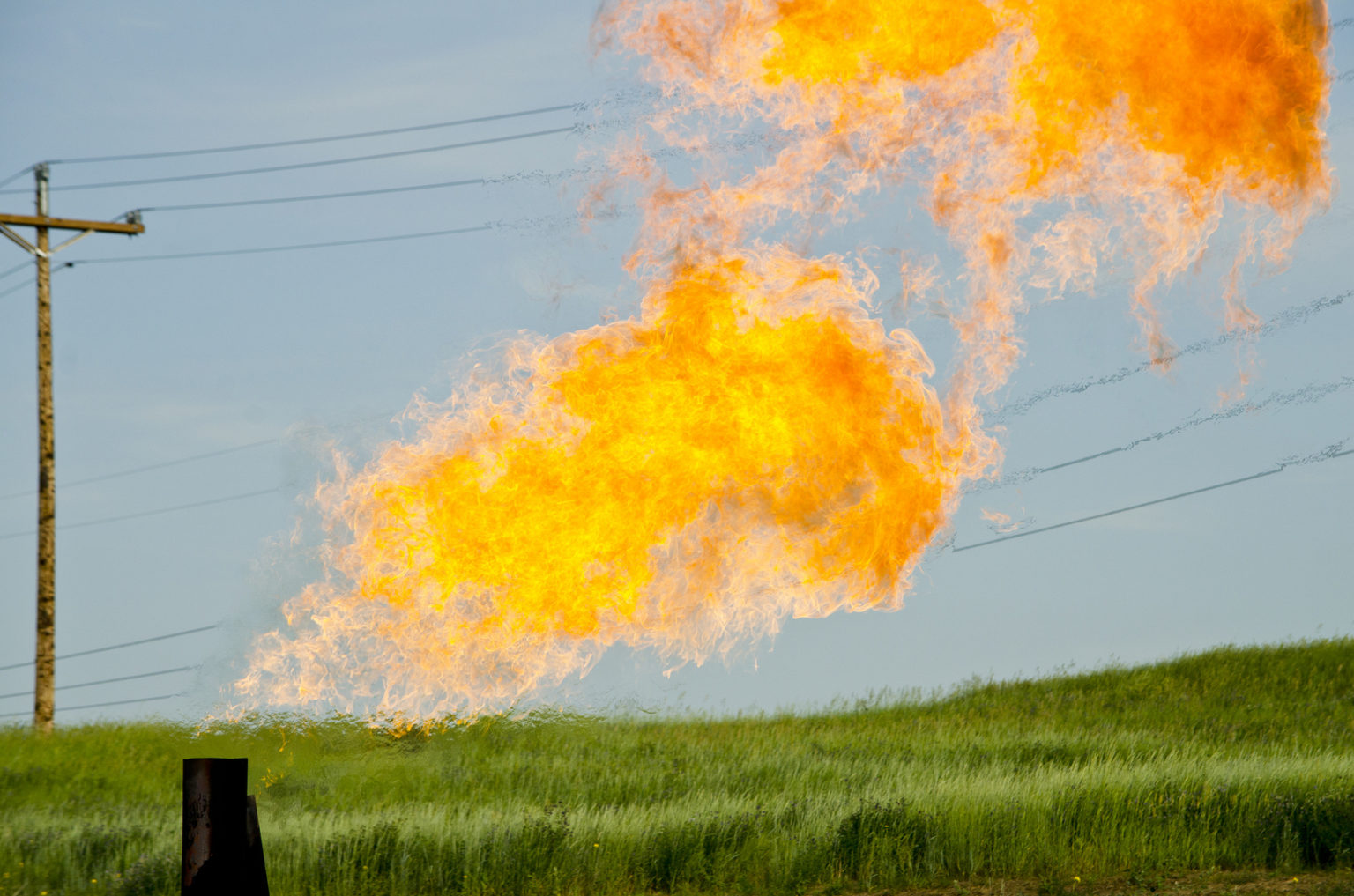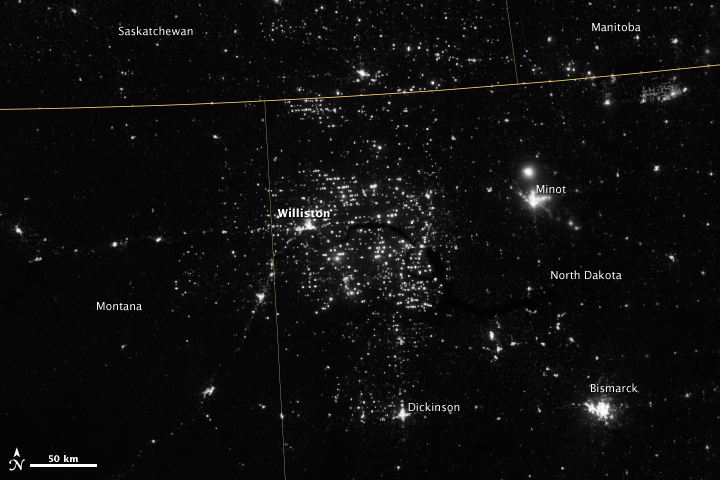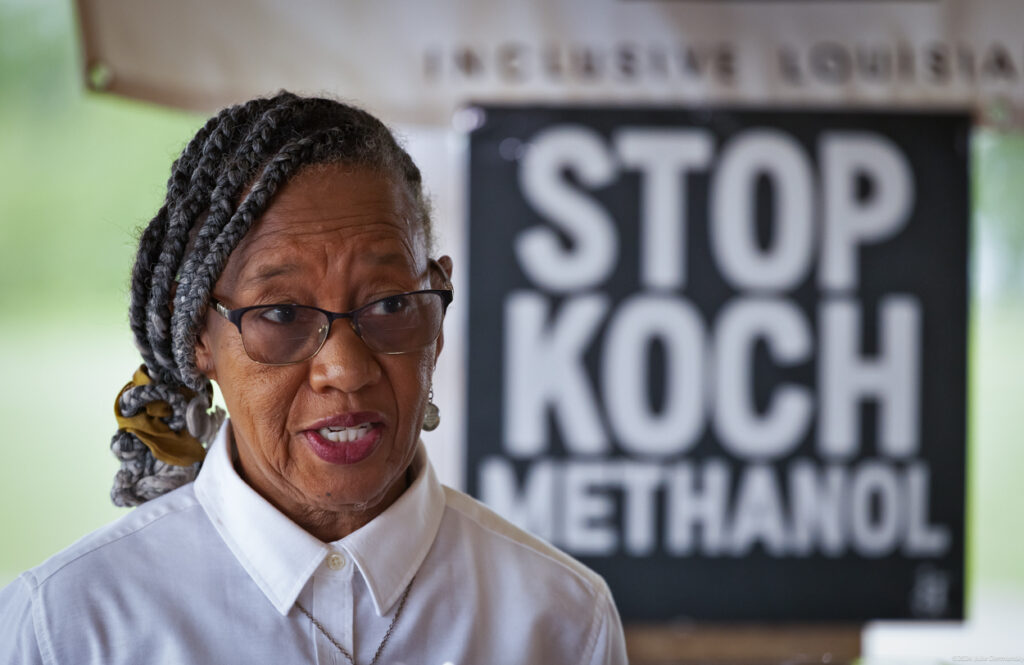Republican leaders in Congress say they’ll use an obscure rule called the Congressional Review Act (CRA) to roll back the Methane Waste and Prevention Rule as early as next week. The rule, finalized by the Bureau of Land Management (BLM) in November 2016, requires oil and gas companies to reduce methane leaks from operations on federal and tribal lands.
An open records request from environmental group Friends of the Earth reveals the top three companies — ExxonMobil, Devon Energy, and Encana Energy — which will profit from the rule’s rollback.
What’s at Stake
Part of Obama’s climate plan, which aimed to reduce methane emissions from oil and gas drilling by 40 percent by 2025, this rule mandated that companies capture and sell methane instead of venting or flaring it.
Oil extraction produces natural gas as a byproduct, and this has been an inconvenience due to the low price of natural gas and the infrastructure needed to move it. The solution: flaring or venting. Every year millions of tons of methane, a potent greenhouse gas often accompanied by hazardous chemicals like benzene, formaldehyde, and ethylbenzene, spew into the atmosphere during venting and flaring.
Environmentalists say that if Congress succeeds in scrapping the rule, not only will greenhouse gas emissions increase, state governments and tribes will lose hundreds of millions of dollars in royalties from oil and gas companies, who stand to recoup that cost.
An estimated $330 million worth of natural gas is lost to venting and flaring every year, according to a 2015 report published by the Environmental Defense Fund.
On Tuesday, Senator Tom Udall (D-NM) defended the Methane Waste and Prevention Rule in the Commerce Committee, refuting Republicans’ claims that the rule would cost jobs, and slamming oil and gas lobbies for pushing its repeal.
“We don’t think it’s okay for Congress to allow oil and gas to return [to getting] their resource for free,” Lukas Ross, climate and energy campaigner at Friends of the Earth, told DeSmog. “The resource [gas] on these lands is owned by the people.”
Who Benefits From the Rule’s Repeal?
A Freedom of Information Act (FOIA) request filed in 2015 and released today by Friends of the Earth gives some insight into the companies that stood to benefit the most from overturning this regulation.
Using information oil producers are required to report to the Office of Natural Resources Revenue (ONRR), Friends of the Earth analyzed total volumes for gas flared, vented, and beneficially used on public lands for the decade from 2004 to 2014 and concluded that the following three companies have the most to gain from the rule’s repeal:
- ExxonMobil and its subsidiary XTO received over 40 million mcf (thousand cubic feet) of free natural gas during the period examined, flaring 2.5 million mcf of it. The estimated market value for the lost gas is over $203 million and the flaring alone is the climate change equivalent to burning over 330,000 barrels of oil.
- Devon Energy received 17 million mcf of natural gas, flaring 2.8 million mcf of it. The total value of lost gas is estimated at over $83 million.
- Encana Energy received 20.1 million mcf of natural gas, totaling an estimated market value of over $102 million. This includes over 137,000 mcf of venting and 1.1 million mcf of flaring—the climate change equivalent of burning nearly 70 million pounds of coal.
But according to Josh Mantell, energy campaign manager for the Wilderness Society, it’s more principle than greed driving coalitions like the American Petroleum Institute and the U.S. Chamber of Commerce to lobby for nullifying the BLM flaring rule.
“The bigger picture for these groups is that all federal regulations are bad,” Mantell told DeSmog. “And now that Republicans hold both houses of Congress and the White House, they’re telling Congressional leaders to use a sledgehammer of a tool like the CRA to roll back these regulations quickly.”
Flaring Regulation Is Broadly Popular
Captured by NASA satellite, drilling equipment, boom-town development, and natural gas flaring in North Dakota’s Bakken oil fields lights up the night sky. Credit: NASA
In planning to scuttle the flaring regulation, Congressional leaders are hardly doing the business of their constituents.
The bipartisan Conservation in the West Poll, released this week, found that 80 percent of surveyed voters in seven Western states — Arizona, Colorado, Montana, Nevada, New Mexico, Utah, and Wyoming — support requiring upgrades to reduce methane flaring and leaks from natural gas development.
Republicans in Congress, and industry lobbying groups, would prefer to leave regulation to the states. Wyoming and Colorado already have regulations on flaring, though weaker than the BLM rule. Even in pro-drilling North Dakota, landowners have filed class action suits against oil companies to capture millions of dollars in allegedly lost royalties due to flaring.
Opponents of the Methane Waste and Prevention Rule claim that between the EPA and states that choose to enact their own regulations, there’s no need for the BLM’s rule. But Jon Goldstein, senior energy policy manager at the Environmental Defense Fund, says those arguments don’t hold water.
“Without BLM regulation, states will lose revenue, and many of these western states are struggling with budget shortfalls and really need these royalties,” Goldstein told DeSmog. “In addition, Colorado will be impacted from pollution from poorly regulated production in nearby New Mexico and Utah.”
How an Obscure Law Can Erase Obama’s Environmental Legacy
Steered into law in 1996 by House Speaker Newt Gingrich, in his Contract with America, the CRA gives Congress the power to kill federal regulations easily. It enables senators and representatives to enter a resolution, rather than a bill, to eliminate a regulation they don’t like, usually those rolled out at the end of a previous president’s term.
Resolutions can’t be filibustered and need only a simple majority to pass. They still require the signature of the president, which shouldn’t be a problem with the current White House.
Over two decades, the CRA has only been used successfully once, in 2001, to nullify a Labor Department’s ergonomics regulation. Today, however, the current Congress has dusted it off in an attempt to roll back much of Obama’s environmental legacy.
The CRA has another powerful consequence. When used to repeal a regulation, it blocks all future administrations from developing “substantially” similar regulations. While never tested, that could prevent the BLM or the Department of the Interior from addressing methane flaring or venting again, barring Congress passing a new law.
“(The CRA) is extreme tool that could have a chilling effect on the agency who wrote the rule it’s used to overturn, in this case the BLM,” Ross told DeSmog. “This rule by the BLM was crafted over a five year process, with thousands of public contacts. To have Congress planning to shut off debate on this in the blink of an eye can make other agencies think twice about crafting rules only to see their work later disappear.”
On Thursday, the same day former ExxonMobil CEO Rex Tillerson was confirmed as Secretary of State, the Senate put the CRA to the test to eliminate the Stream Protection Rule, a regulation finalized in December 2016, to prohibit coal mining companies from dumping debris and waste into nearby waterways. The resolution passed 54-45, a day after it was approved by the House.
Main image: The Environmental Defense Fund estimates that $330 million worth of natural gas is lost to venting and flaring every year. Credit: Tim Evanson, CC BY–SA 2.0
Subscribe to our newsletter
Stay up to date with DeSmog news and alerts







